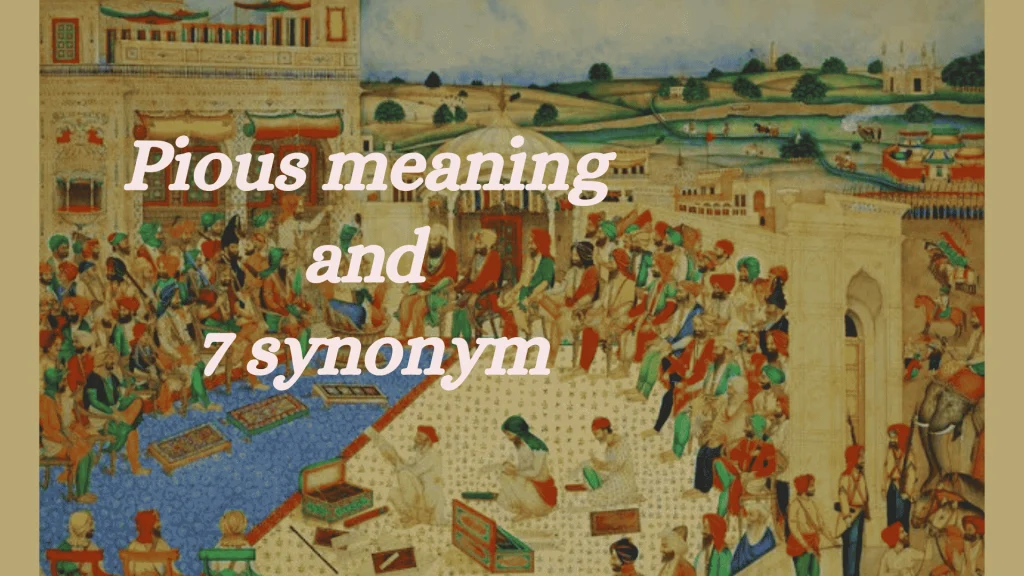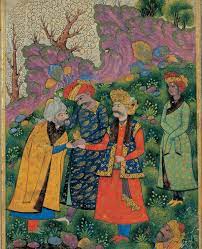Pious meaning and 7 synonym
The word “pious” is an adjective that describes a deep religious devotion or reverence for a god or a higher power. It can also refer to someone who is devoutly religious or displays a strong commitment to their religious beliefs. Here are seven synonyms for “pious”:
Spiritual
Holy
Devout
Religious
Reverent
God-fearing
Faithful
These words all convey a sense of strong religious devotion or adherence to religious principles.
King and thief-story about Pious.
Once upon a time, there was a thief. He entered the palace of the king with the intent to steal. It was nighttime. The sound of the king and his wife’s conversation was coming from a room. He stood up and listened, though it is wrong to listen, It’s illegal, it’s theft, but the thief came to steal.
After all, he was a thief. The thief heard the king say to his wife, “I will marry my daughter to a man who is very Pious and devout.”
When the thief was listening, his heart felt a thought.
Aya why not I become something that the king marry the princess with me? Got agreed in heart, Now he forgot to steal but got down to cheat. Went home and spent too long thinking about how I can succeed at this. Then a plan came to his mind that there is a mosque near the king’s palace. And if I go there and dressed in the clothes of the elders and decided to sit there engaged in worship day and night. perhaps this thing would reach the king.
If there is a pious man here, who is busy worshipping Allah day and night, the eyes of the king may fall upon me and I be chosen to marry the princess. This thief’s goal was really heinous and worldly, and it was intended for them.
Then according to his program, he decided to dress up the elders, and went to this mosque and started prayers, recitation, meditation, and all. Days went by. The legend that a great saint had been sent here by Allah quickly spread among the populace.
Who worship day and night.
Until it reached the king that there is a man of the servants of Allah sitting there. Who is also young. Unanswerable in piety. When the king found out about this. He began to think according to his intention. That is why not choose his for what he thought of the princess. The king sent his minister to discuss this regard. Going to the mosque, the priest kindly informed him. I am at your service. I brought a message from the King.
He asked what’s the message?
The minister said that the king had decided several years ago that he would marry his daughter to a man who is very Pious and devout and Allah-wala. They were searching for him. Therefore the King has sent me to speak to you in this regard. This man had come here with the same desire. kept listening to the minister for a long time. Then tears rolled down his eyes, and the minister asked,
what’s the matter?
So he said I do not accept the message you have brought today, the minister said why not? The man said let me tell you. I was a thief and once went into the king’s palace intending to steal. Then I narrate whatever happened. Then this thief said I took this position out of greed and I sat here and my God made me his.
Now I don’t need anyone else after that my ALLAH is enough for me.
Indeed! When worship becomes worship, prayer becomes prayer, zikr becomes zikr and our other worships become worships. Then indeed these prayers and worships prevent man from doing evil.
CONCLUSION:
This story highlights the transformative power of spirituality and devotion. The thief, initially driven by his desire to marry the princess, embarks on a deceitful path. However, as he immerses himself in prayer and meditation, his intentions change, and he undergoes a profound inner transformation.
Key takeaways from the story:
The Thief’s Change of Heart: The thief’s initial intention was to deceive and manipulate his way into marrying the princess, driven by greed and worldly desires. However, as he sincerely engages in worship and spiritual practices, he experiences a change of heart. His focus shifts from materialistic goals to a genuine connection with a higher power.
The Power of Devotion: The story emphasizes the idea that sincere devotion and worship can have a profound impact on an individual’s character and choices. The thief’s dedication to prayer and meditation leads him to a deeper understanding of spirituality and a rejection of his previous life of crime.
Transformation and Redemption: The thief’s transformation from a dishonest and greedy individual to a genuinely pious person showcases the potential for redemption and change in anyone. It illustrates that it’s never too late to turn one’s life around and seek a path of righteousness.
The Preventive Power of Faith: The story suggests that when one’s faith and devotion are genuine, they serve as a protective shield against wrongdoing. In this case, the thief’s newfound spirituality prevents him from pursuing his initial dishonest intentions.
In conclusion, this story serves as a reminder of the transformative power of spirituality and the potential for redemption in individuals who genuinely seek a path of righteousness. It also underscores the idea that true devotion and worship can guide one away from unethical and worldly pursuits.
FAQ:
What is the meaning of the word pious?
The word “pious” is an adjective that describes a deep religious devotion or a strong commitment to religious principles and beliefs. It is often used to characterize someone who is devout, reverent, and dedicated to their faith or religious practices. Pious individuals are typically seen as morally upright and virtuous, as they strive to live in accordance with their religious teachings and values. However, it’s important to note that the term can sometimes carry connotations of excessive or ostentatious religiosity, depending on the context in which it is used.
What does it mean to be a pious person?
Being a pious person typically means being deeply religious or devoutly committed to one’s religious beliefs and practices. The specific interpretation of piety can vary significantly depending on the religious tradition and culture. However, there are some common characteristics associated with piety:
Faithfulness: A pious person is often characterized by unwavering faith in their religious beliefs and the divine. They trust in their religion’s teachings and doctrines.
Devotion: Piety involves a strong commitment to religious rituals, practices, and observances. This may include regular prayer, attending religious services, and participating in religious festivals and ceremonies.
Morality: Pious individuals often strive to live a morally upright and virtuous life according to the ethical principles and commandments of their religion. They seek to follow the moral guidelines set forth by their faith.
Humility: Piety is often associated with humility and a recognition of one’s own imperfections and dependence on the divine. Pious individuals may engage in acts of humility, such as acts of charity or selflessness.
Respect for Others: A pious person typically shows respect and tolerance toward individuals of other faiths and beliefs, recognizing the diversity of religious perspectives in the world.
Prayer and Meditation: Many pious individuals engage in regular prayer or meditation to strengthen their connection with the divine and seek guidance, solace, or spiritual growth.
Stewardship: Some religious traditions emphasize stewardship of the environment, community, or the less fortunate as a part of piety. This involves taking care of the world and its inhabitants as a religious duty.
Scripture Study: Pious individuals may spend time studying and reflecting upon the sacred texts and teachings of their religion as a means to deepen their understanding and strengthen their faith.
Community Involvement: Being pious often involves active participation in religious communities and activities. Pious individuals may play roles within their religious communities, such as volunteering or leadership positions.
It’s important to note that the concept of piety can vary significantly from one religion to another. What constitutes piety in Christianity, for example, may differ substantially from what it means in Islam, Buddhism, Hinduism, or other belief systems. Additionally, the degree of piety can also vary among individuals within the same religious tradition.
What is an example of being pious?
Being pious typically refers to a strong devotion or reverence for religious principles, beliefs, and practices. Pious behavior can vary greatly depending on one’s religious beliefs and traditions, but here’s a general example of what it might look like in a religious context:
Example: A devout Christian regularly attends church services, actively participates in prayer and worship, follows the teachings and commandments of Christianity, and seeks to live a life in accordance with their faith.
They may also engage in acts of charity, volunteer for church-related activities, and strive to be a moral and ethical person in their daily life as guided by their religious convictions.
It’s important to note that being pious can manifest differently across various religions and belief systems, and what is considered pious in one context may not be the same in another. Additionally, piety can extend beyond religious beliefs and can also refer to a deep respect or devotion to principles, values, or causes outside of religion.
What is a synonym for pious?
A synonym for “pious” is “devout.” Other synonyms for “pious” include:
Religious
Reverent
Faithful
Godly
Devotional
Holy
Sanctimonious (though this term can carry a negative connotation of excessive or hypocritical piety)
Prayerful
Spiritual
Virtuous
The choice of synonym may depend on the context in which you are using the word and the specific nuance you want to convey.
Does pious mean self righteous?
No, “pious” and “self-righteous” are not the same, although they can sometimes be related in certain contexts.
“Pious” generally refers to a strong devotion to religious beliefs or a sincere reverence for religious principles. It describes a person who is devout, faithful, and often behaves in a way that aligns with their religious convictions. Pious individuals are typically seen as genuinely committed to their faith.
On the other hand, “self-righteous” refers to a person who believes they are morally superior or righteous compared to others. They often display a sense of moral superiority and may judge or condemn others for not living up to their own perceived moral standards. Self-righteousness is more about an attitude of moral superiority rather than a strong devotion to religious beliefs.
While someone who is pious may indeed be genuinely devoted to their religion and its moral principles, it doesn’t necessarily mean they are self-righteous. However, in some cases, a pious person could exhibit self-righteous behavior if they believe their religious devotion makes them morally superior to others, but these terms are not inherently synonymous.
What does pious mean in Islam?
In Islam, the term “pious” is used to describe a person who is devoutly religious, characterized by a deep and sincere devotion to their faith and a commitment to living a righteous and morally upright life according to Islamic principles.
Pious individuals are often seen as those who diligently observe the religious rituals and obligations of Islam, such as daily prayers, fasting during Ramadan, giving to charity (zakat), and making the pilgrimage to Mecca (Hajj) if financially and physically able.
Pious Muslims strive to cultivate qualities such as piety, humility, sincerity, and a strong connection with God (Allah). They seek to avoid sinful behaviors and to act in accordance with the teachings of the Quran and the Hadith (the sayings and actions of the Prophet Muhammad, peace be upon him).
Being pious in Islam is considered a virtue, and it is often associated with a sense of inner peace, moral integrity, and a strong relationship with God.



